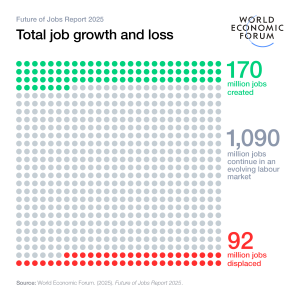The World Economic Forum (WEF) has released the ‘Future of Jobs Report 2025’, highlighting the employability and job force by 2030 that will shape the labour force market. The report predicts that 22% of jobs will face a decline. According to the Future of Jobs Report 2025, the global labour market is being altered by technological advancement, the green transition, and economic and demographic changes. The jobs created are equivalent to 14% of current employment. These tendencies will also result in the displacement of 92 million jobs, which means a net growth of 78 million jobs.
So, what will those jobs be, and what skills will be required to land them? To find out, the study surveyed over 1,000 of the world’s largest employers, representing 22 industry clusters and more than 14 million workers.
Five Emerging Job Roles for the Future
Some jobs are rapidly growing in percentage terms; demand for roles driven by technological advancements such as artificial intelligence (AI) is on the rise. These positions include prominent data specialists, fintech engineers, and AI and machine learning experts. The report highlights the 15 professions with the most considerable net growth and decline based on surveyed company estimates and International Labour Organization employment data. The most significant growing jobs are dominated by roles core to many economies.
Farmworkers top the list. Green transition trends, such as reducing carbon emissions and adapting to the climate crisis, will drive growth, providing 34 million new jobs by 2030 in addition to the 200 million farmworkers already working. Widening digital access and growing living costs are also helping to drive the profession’s rise. Delivery drivers, software developers, building construction workers, and shop salespersons complete the top five.
Food processing workers are also among the fastest-growing jobs. In contrast, care positions, such as nursing professionals, social workers, and counselling experts, are expected to expand significantly over the next five years. According to the Report, this is due to demographic trends, particularly the ageing of working-age populations.
The future of Work will Bring Both Challenges and Opportunities
According to the Future of Jobs Report 2025, employers expect 39% of key job skills to change by 2030. This percentage represents significant disruption. However, it is down from 44% in 2023. A growing emphasis on continuous learning, upskilling, and reskilling programmes has helped companies better anticipate and manage future skill requirements. Technological skills are projected to grow in importance more rapidly than any other skill in the next five years. AI and big data are at the top of the list, followed by network cybersecurity and technological literacy. Creative thinking, resilience, flexibility, and agility are also rising in importance, along with curiosity and lifelong learning.
Concluding the List of Top 10 Emerging Skills
Leadership and social impact, talent management, analytical thinking, and environmental stewardship complete the top 10 most in-demand skills.
According to the report, businesses are increasingly investing in reskilling and upskilling programmes to better align their workforce with changing expectations. The World Economic Forum’s Centre for the New Economy and Society works with businesses, academia, and governments to assist people throughout the world in preparing for the economy of the future, notably through its Jobs Initiative and Reskilling Revolution platforms.
The report highlights macro trends impacting skills and jobs and workforce transformation strategies.
Postal services, clerical professions, and administrative manual jobs such as assistants and secretaries will experience significant declines in the coming years. The rise of machine learning, cloud computing technologies, and advancements in the AI sector are the main drivers of the decline in such roles.
About the World Economic Forum
Established in 1971, the World Economic Forum is the International Organization for Public-Private Cooperation. It provides a global, impartial, not-for-profit platform for meaningful connections between stakeholders to establish trust and build initiatives for cooperation and progress. WEF brings together governmental, corporate, intellectual, civil society, and other leaders to define global, regional, and industry agendas in a world filled with complex challenges. Its aim to improve the state of the world lies in the belief in the power of human ingenuity, entrepreneurship, innovation and cooperation. It recognises the need for a forum fostering rigorous and respectful dialogue between and among leaders with different beliefs and viewpoints, where diversity of thought is respected, and all voices can be heard.



